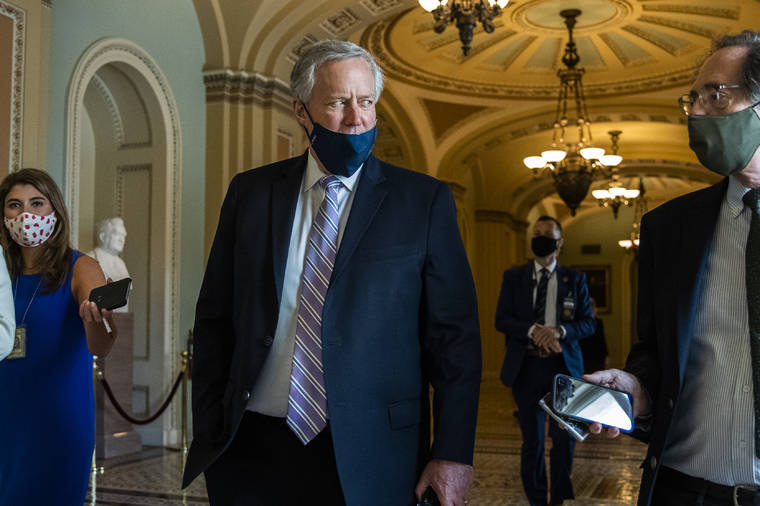WASHINGTON — The top White House negotiators are set to meet with House Speaker Nancy Pelosi late Monday at the Capitol on the next coronavirus relief package with deadlines looming as they race to prevent unemployment assistance and an eviction moratorium from expiring for millions of Americans.
Pelosi implored Republicans and the White House to stop their infighting and come to the negotiating table with Democrats. Republicans want to slash the $600 weekly jobless benefits boost to $200, according to Republicans speaking on condition of anonymity to discuss the emerging plan. Treasury Secretary Steven Mnuchin and White House chief of staff Mark Meadows were set to meet with Pelosi and Democratic Senate leader Chuck Schumer at the speaker’s office.
“Time is running out,” Pelosi said.
Pelosi invited GOP leaders and White House negotiators to her office after Senate Majority Leader Mitch McConnell’s planned release of the Republican’s $1 trillion proposal.
The Republican leader is poised to try again to unveil his plan after last week’s effort came to an abrupt halt amid infighting with the White House. It’s a long-awaited GOP counteroffer to Pelosi’s $3 trillion effort passed in May.
“Senate Republicans have offered another bold framework to help our nation,” McConnell said as he opened the Senate.
But even as Senate Republicans push ahead, the White House is now suggesting a narrower relief package may be all that’s possible with Friday’s approaching deadlines.
With the virus death toll climbing and 4.2 million infections nationwide, millions of out-of-work Americans will lose an $600 federal unemployment benefit that is expiring, and federal eviction protections for many renters are also coming to an end. President Donald Trump’s standing is at one of the lowest points of his term, according to a new AP-NORC poll.
A GOP aide briefed on the bill said the plan is to cut the jobless boost to $200 a week as it phases out to a new system that ensures no more than 70% of an employee’s previous pay. Another Republican said the boost would be available for up to four months to give states time to transition to the new system. The aides spoke on condition of anonymity because the bill hadn’t been released.
Republicans have argued that the federal unemployment boost should be trimmed because the combination of state and federal jobless assistance left many people better off financially than they were before the pandemic and therefore disinclined to return to their jobs.
Many Democrats contend that a lot of people don’t feel safe going back to work when the coronavirus is surging again around the country.
Pelosi panned the Trump administration’s desire to trim the $600 weekly unemployment aid to ensure no more than 70% of prepandemic wages. She also has resisted tackling a relief package in piecemeal fashion, arguing that broader aid is needed for Americans.
“Children are hungry, families cannot pay the rent, unemployment is expiring and the Republicans want to pause again and go piecemeal,” Pelosi said.
“We have stood ready to negotiate for more than two months,” she said. She implored them to come to her office “and get the job done.”
Mnuchin and Meadows, in appearances Sunday, cited unemployment benefits, money to help schools reopen, tax credits to keep people from losing their jobs and lawsuit protections for schools and businesses as priorities for quick relief.
“We can move very quickly with the Democrats on these issues,” Mnuchin said.
McConnell’s plans to introduce a $1 trillion virus rescue bill collapsed Thursday during GOP fighting over its size, scope and details.
As he opened the Senate, he offered more details of the plan. It was expected to bring $105 billion to help schools reopen, new money for virus testing and benefits for businesses, including a fresh round of loans, tax breaks and a sweeping liability shield from COVID-19-related lawsuits.
McConnell said there would be another round of $1,200 direct payments based on the same formula from the earlier aid bill. Then, people making $75,000 or less received the full amount and those making more than $75,000 received less, depending on their income. People earning above $100,000 did not qualify for the payment.
The $600 weekly jobless benefits boost officially expires July 31, but because of the way states process unemployment payments, the cutoff was effectively Saturday.
———
Associated Press writers Darlene Superville and Hope Yen contributed to this report.


